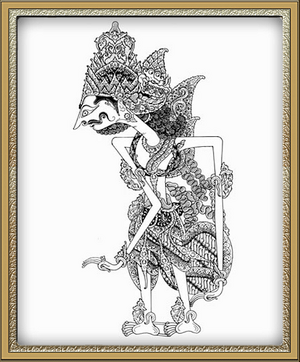Basukunti - (Wayang Kulit)
| Title | Basukunti - (Prabu) - Mahabharata |
|---|---|
| Other names | Wasukunti, Suradewa |
| Size | 50 cm |
| Personal data | Prabu Basukunti was the eldest son of Prabu Wasukunteya, the king of Mandura State with his consort Dewi Sungganawati. He has a younger brother named Kuntadewa, who after becoming the king of the Boja country was titled Prabu Kuntiboja. Prabu Basukunti married Dewi Dayita, daughter of Prabu Kunti, king of Boja. From that marriage he had 4 (four) sons each named: Arya Basudewa, Goddess Prita/Goddess Kunti, Arya Prabu Rukma and Arya Ugrasena. |
| Appearance | Prabu Basukunti has traits and character; brave, intelligent, wise and helpful. |
| Collection | Private collection |
Basukunti – (Prabu) – Mahabharata
Basukunthi Boja has a heavy burden when it comes to accepting reality. All of his children have disgrace, Basudewa, Aryapraburukma, Ugrasena, and Dewi Kunthi, all have their own problems. When his sons are fascinated by seeing a Manduro royal dancer named Yasudha, or better known to us Nyai Sagopa, Vasudeva has a child, Udawa and Sagopi, Aryaprabu has a child, Siti Lestari and Ugrasena has a child, Adimanggala. Dewi Kunthi, even though she had a child out of wedlock by using her Ajianya, was still considered a disgrace by her father.
King Basukunti hoped to improve the name of the Manduro Kingdom, when he had a grandson named Narayana from his son Basudewa, a teenager who was born by Bathara Vishnu to defeat the wrathful Angkara on earth.
But unfortunately something worse happened, because Narayana had children and has become Queen in Dwarawati nicknamed Prabu Kresna, and is a pamomong at The Pandawa side. He was considered unable to guide his children until the Gojali Suto War occurred, a war between the son and the father.
Again here the name of the Manduro lineage was tarnished, until the end of his life Kresna found it difficult to enter Swargo. After his old age, Prabu Basukunti handed over the throne of the kingdom of Mandura to his eldest son, Arya Basudewa and lived as a brahmin until he died.
Source: History of Wayang Purwa - Hardjowirogo - PN Balai Pustaka - 1982


